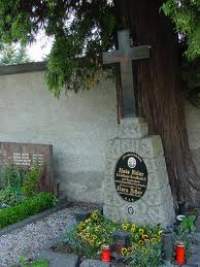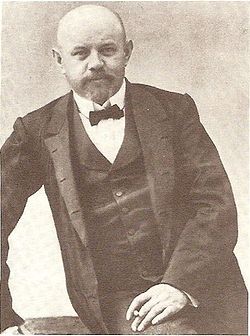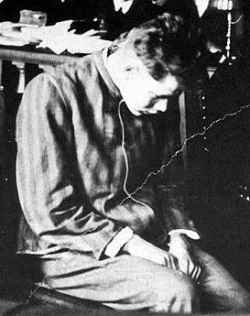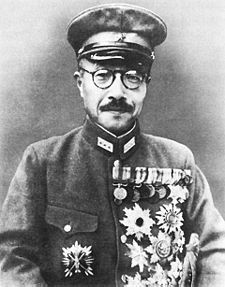
1728 Prussia and the Empire: The Treaty of Berlin is agreed between the Holy Roman Emperor Charles 6th and Frederick William of Prussia, by which the Emperor recognizes Prussia's claim to the duchies of Berg and Ravenstein in the Holy Roman Empire, while Prussia guarantees the Pragmatic Sanction, accepting the right of the Emperor's daughter, Maria Theresa, to succeed him as ruler of all the Habsburg domains.
1822 Birth: Sebastian Wilhelm Valentin Bauer: German pioneer inventor of submarines:
On 1 Feb 1851, in Kiel Harbor, he made a test-dive in his first submarine, Le Plongeur-Marin ("The Marine Diver"), only to sink 50-ft due to water leaks in the hull. He survived by waiting for the inside air pressure, compressed as more water leaked in, to match the water pressure outside. Seven hours later, he and his crew opened the hatch and rose to the surface to find funeral services in progress. In 1855, Bauer built a treadmill-powered, 52-ft iron submarine, Le Diable-Marin ("The Marine Devil") carrying 11 crew. The photographs Bauer made through its windows are probably the first taken underwater. He also experimented on air purification and underwater sound signals." [For further details, Click here.]
1907 Funeral: Klara Hitler is buried next to her husband in the Catholic cemetery at Leonding:

Dr. Bloch: I did not attend Klara Hitler's funeral, which was held on Christmas Eve. The body was taken from Urfahr to Leonding, only a few miles distant. Klara Hitler was buried beside her husband in the Catholic cemetery, behind the small, yellow stucco church. After the others—the girls, and the postmaster's widow—had left, Adolf remained behind; unable to tear himself away from the freshly-filled grave.
1915 Vera Brittain's fiance killed on the Western Front:
Roland Leighton, the fiance of Vera Brittain, a nurse in the British Red Cross who will become a famous author and feminist after the war, dies of wounds sustained in battle at the Western Front in France.
Brittain, born in 1893, grew up as part of a prosperous family in the North of England. In 1915, she abandoned her studies at Oxford to enlist in the armed forces as a nurse. Over the next three years, she served in London, Malta and on the Western Front. After the war ended, Brittain devoted herself to the causes of peace and women's rights. The author of 29 books in all, she is perhaps best known for her first book, the war memoir Testament of Youth, in which she chronicles her experiences of war and loss.
"The war at first seemed to me an infuriating personal interruption rather than a world-wide interruption," Brittain admits early in Testament of Youth. Her longtime dream to get out of the provinces and attend Oxford was just coming true when war broke out. By that time, she had met and fallen in love with Roland Leighton, a schoolmate of her younger brother Edward. Soon, both Roland and Edward had enlisted in the British army.
Roland went to the front on March 31, 1915. During a leave that year, he and Vera were formally engaged. She began working as a nurse . . . . was preparing for his arrival on another leave at Christmas time when she received a telephone message informing her of his death . . . . in the trenches. He died the next day in a hospital bed in nearby Louvencourt, France.
By war's end, Vera Brittain's brother, Edward, was also dead--killed in action in Italy on June 15, 1917--as well as several of her good friends . . . . Brittain writes in her foreword, as the rumblings of another great international conflict were already making themselves heard, that her object in writing Testament of Youth was at least in part to keep the horror of the Great War alive.
1918 Birth: Helmut Schmidt: Chancellor of West Germany 1974-82.
1919 First hospital ship designed to be used as an ambulance for the transport of sick and wounded patients is launched: The USS Relief, with 515 beds. [For further details, Click here.]
1923 Death: Dietrich Eckart—from heart failure—after a brief imprisonment in Stadelheim prison. Hitler is still in prison awaiting trial. Eckart is buried at Berchtesgaden. (Wistrich I).

Dietrich Eckart was a German politician, one of the important early members of the National Socialist German Workers Party (NSDAP, or Nazi party) and a participant [in] the 1923 Beer Hall Putsch . . . . Eckart was a very successful playwright, especially for his adaptation of Henrik Ibsen's Peer Gynt, one of the most well attended productions of the age with more than 600 performances in Berlin alone. It was this success that not only made Eckart a wealthy man, but gave him the social contacts needed to introduce Hitler to dozens of important German citizens of the day. These introductions proved to be pivotal in Hitler's ultimate rise to power.
Later on, he developed an ideology of a "genius superman", based on writings by Lanz von Liebenfels; he saw himself following the tradition of Arthur Schopenhauer and Angelus Silesius. He also became fascinated by the Buddhist doctrine of Maya (illusion). Eckart loved and strongly identified with Peer Gynt, but never had much sympathy for the scientific method.
Between 1918 and 1920, Eckart edited the anti-Semitic periodical Auf gut Deutsch, published along with Alfred Rosenberg and Gottfried Feder. A fierce critic of the Weimar Republic, he vehemently opposed the Treaty of Versailles, which he viewed as treason, and was a proponent of the so-called Dolchstosslegende, according to which the Social Democrats and Jews were to blame for Germany's defeat in World War I.
1933 Various:
Birth: Akihito:

Third Reich: Marinus van der Lubbe is found guilty and sentenced to death for setting fire to the Reichstag earlier in the year.

Church and Reich: Pope Pius XI condemns the Nazi sterilization program. (Edelheit)
1935 Abyssinia (Ethiopia): The Italian air force begins using mustard gas.
1938 Antisemitism: Hungary: Parliament introduces new racially defined anti-Semitic laws.
1939 Various:
Death: Anthony H. G. Fokker:
World War II: Finland: The Finnish counteroffensive at Summa continues to plague the overconfident Soviet invasion force. The poor showing of Stalin's troops in this conflict will lead Hitler, and most of the world, to seriously underestimate the ability of the Red Army.
World War II: Commonwealth: The first 7,500 Canadian troops arrive in the United Kingdom.
1940 World War II: Cabinet reshuffle: Lord Halifax becomes British ambassador to the US; Anthony Eden takes over as Foreign Secretary; and David Margesson, Secretary of War (Army Minister).
1941 World War II: Various:
War in the Pacific:
Burma: Japan continues its assault on Rangoon.
North Africa: British troops overrun Benghazi in Libya.
1942 World War II: Various:
Entertaining the troops:
Netherlands: The Allies launch an air attack on Den Helder:
Eighteen Bostons bombed St-Malo docks and 6 Venturas bombed naval installations at Den Helder. The Den Helder bombing was particularly accurate and serious damage was caused to a torpedo workshop and other buildings. No were aircraft lost.
1943 Countdown to D-Day: General Montgomery is advised that he will command the British and Canadian armies on D-day.
1944 World War II: The execution of Eddie Slovik is authorized:
On this day, Gen. Dwight Eisenhower endorses the finding of a court-martial in the case of Eddie Slovik, who was tried for desertion, and authorizes his execution, the first such sentence against a U.S. Army soldier since the Civil War, and the only man so punished during World War II.
Private Eddie Slovik was a draftee. Originally classified 4-F because of a prison record (grand theft auto), he was bumped up to a 1-A classification when draft standards were lowered to meet growing personnel needs. In January 1944, he was trained to be a rifleman, which was not to his liking, as he hated guns.
In August of the same year, Slovik was shipped to France to fight with the 28th Infantry Division, which had already suffered massive casualties in the fighting there and in Germany. Slovik was a replacement, a class of soldier not particular respected by officers. As he and a companion were on the way to the front lines, they became lost in the chaos of battle, only to stumble upon a Canadian unit that took them in.
Slovik stayed on with the Canadians until October 5, when they turned him and his buddy over to the American military police, who reunited them with the 28th Division, now in Elsenborn, Belgium. No charges were brought; replacements getting lost early on in their tours of duty were not unusual. But exactly one day after Slovik returned to his unit, he claimed he was "too scared and too nervous" to be a rifleman and threatened to run away if forced into combat. His admission was ignored-and Slovik took off. One day after that he returned, and Slovik signed a confession of desertion, claiming he would run away again if forced to fight, and submitted it to an officer of the 28th. The officer advised Slovik to take the confession back, as the consequences would be serious. Slovik refused, and he was confined to the stockade.
The 28th Division had seen many cases of soldiers wounding themselves or deserting in the hopes of a prison sentence that would at least protect them from the perils of combat. So a legal officer of the 28th offered Slovik a deal: Dive into combat immediately and avoid the court-martial. Slovik refused. He was tried on November 11 for desertion and was convicted in less than two hours. The nine-officer court-martial panel passed a unanimous sentence: execution-"to be shot to death with musketry."
Slovik's appeal failed. It was held that he "directly challenged the authority" of the United States and that "future discipline depends upon a resolute reply to this challenge." Slovik was to pay for his recalcitrant attitude-and he was to be made an example. One last appeal was made-to General Dwight D. Eisenhower, the Supreme Allied Commander. The timing was bad for mercy. The Battle of the Bulge in the Ardennes forest was issuing in literally thousands of American casualties, not to mention the second largest surrender of an American Army unit during the war. Eisenhower upheld the sentence.
Slovik would be shot to death by a 12-man firing squad in eastern France in January of 1945. None of the rifleman so much as flinched, believing Slovik had gotten what he deserved. (History.com)
1946 Truman considers amnesty for draft dodgers:

On this day in 1946, President Harry S. Truman appoints an amnesty board to review cases of conscientious objectors (CO's) who were imprisoned after refusing to serve during World War II.
Truman's predecessor, Franklin Roosevelt, had pardoned select World War I "draft dodgers" in 1933. In preparation for the Second World War, Roosevelt tried to avoid jailing CO's by offering them the opportunity to participate in a domestic civil-service program instead that included work on farms and in hospitals. Although approximately 25,000 men did take FDR up on his offer or joined the military and served in non-combat roles, 15,000 more chose not to support the war effort at all--some of these were charged with violating federal conscription law and imprisoned. Truman, in the spirit of forgiveness, appointed the board to review individual cases of those who were jailed, with the idea that anyone who had been unjustly punished would be pardoned.
A year later, the board reported back to Truman. Of the 15,000 violators of the World War II Selective Service Act, only 1,500 were considered entitled to full amnesty. Most were members of historically "pacifist" religious sects such as the Quakers and Mennonites. On December 23, 1947, Truman granted pardons to those 1,500 and restored their political and civil rights. (Those who had originally been jailed as convicted "felons" lost voting rights, and even after their release were prevented from obtaining certain jobs or holding public office.) As the board was given the power to define what constituted a legitimate "religious organization," hundreds of Jehovah's Witnesses were not considered, nor were those who protested the war for personal reasons other than religion, including the belief that the draft violated the U.S. Constitution.
In 1948, former first lady Eleanor Roosevelt, then a human rights activist, was approached by several religious and civil rights organizations, including the American Friends Service Committee, the Federal Council of Churches and the American Civil Liberties Union to advocate on their behalf for broader amnesty. Eleanor wrote to Truman and asked for a review of the thousands who had yet to be considered for pardons. Truman wrote back, admitting that he had little sympathy for the majority of conscientious objectors; in fact, he viewed them with contempt, believing them to be "just plain cowards or shirkers." Truman believed that many CO's used religion as an excuse to avoid service and told Eleanor that he thought all the "honest" conscientious objectors had been identified by his Amnesty Board. Truman was not the only president to grant clemency to draft dodgers: Gerald R. Ford and Jimmy Carter offered pardons in 1974 and 1977 respectively. (History.com)
1948 Japanese war criminals hanged in Tokyo:

In Tokyo, Japan, Hideki Tojo, former Japanese premier and chief of the Kwantung Army, is executed along with six other top Japanese leaders for their war crimes during World War II. Seven of the defendants were also found guilty of committing crimes against humanity, especially in regard to their systematic genocide of the Chinese people.
On November 12, death sentences were imposed on Tojo and the six other principals, such as Iwane Matsui, who organized the Rape of Nanking, and Heitaro Kimura, who brutalized Allied prisoners of war. Sixteen others were sentenced to life imprisonment, and the remaining two of the original 25 defendants were sentenced to lesser terms in prison.
Unlike the Nuremberg trial of German war criminals, where there were four chief prosecutors representing Great Britain, France, the United States, and the USSR, the Tokyo trial featured only one chief prosecutor--American Joseph B. Keenan, a former assistant to the U.S. attorney general. However, other nations, especially China, contributed to the proceedings, and Australian judge William Flood Webb presided. In addition to the central Tokyo trial, various tribunals sitting outside Japan judged some 5,000 Japanese guilty of war crimes, of whom more than 900 were executed. (History.com)
1953 Death: Lavrenty Beria: On this date in 1953, Stalin's feared minister Lavrenty Beria was shot, finally on the receiving end of the cruelty he had administered to countless Soviet citizens. [For further details, Click here.]
Edited by Levi Bookin (Copy editor)
levi.bookin@gmail.com



Click to join 3rdReichStudies

FAIR USE NOTICE: This site may contain copyrighted material the use of which has not always been specifically authorized by the copyright owner. We are making such material available in our efforts to advance understanding of historical, political, human rights, economic, democracy, scientific, environmental, and social justice issues, etc. We believe this constitutes a 'fair use' of any such copyrighted material as provided for in section 107 of the US Copyright Law. In accordance with Title 17 U.S.C. Section 107, the material on this site is distributed without profit to those who have expressed a prior interest in receiving the included information for research and educational purposes. If you wish to use copyrighted material from this site for purposes of your own that go beyond 'fair use', you must obtain permission from the copyright owner.
Please note that the list-owner and the moderators are not responsible for, and do not necessarily approve of, the random ads placed on our pages by our web server. They are, unfortunately, the price one pays for a 'free' website.